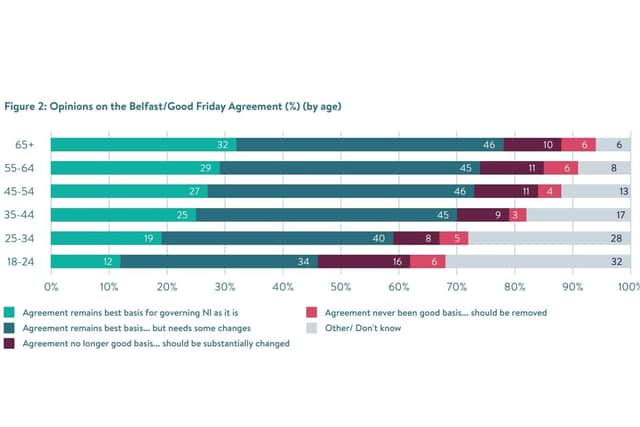Young people ‘least confident’ about GFA with ‘negative’ or ‘don’t know’ attitudes among 54% of 18-24s
and live on Freeview channel 276
Thirty per cent of people aged under 35 replied that they ‘don’t know’ when asked about the peace accord.
A new survey by researchers from Queen’s University and Ulster University has found that older people are more positive in their attitudes to the Good Friday Agreement which was signed 25 years ago on Monday, April 10.
Advertisement
Hide AdAdvertisement
Hide AdThe ‘Political Attitudes in NI 25 Years after the Agreement’ module of the the NI Life and Times (NILT) survey was published by Queen’s academics Katy Hayward and Ben Rosher on Thursday.


The results show that ‘there is broad support for the 1998 Agreement, with 69 per cent saying it remains the best basis for governing Northern Ireland’ although ‘55 per cent believe it needs at least some reform to work effectively for Northern Ireland’.
The research shows that people aged under-35 – the oldest of whom would have been starting secondary school in April 1998 – were more likely to have ambivalent attitudes.
"Younger people are the least confident about the 1998 Agreement, with 30 per cent of under-35s answering ‘don’t know’ when asked their opinion on it,” the author’s state.
Advertisement
Hide AdAdvertisement
Hide AdThe poll shows that a majority of people in the youngest age category surveyed - those aged between 18 and 24 - either believed the agreement was no longer a good basis for governing the North (16 per cent), had never been a good basis for governing the North (six per cent), or that they didn't know (32 per cent), in total 54 per cent of that age group – a majority.
The research also shows high levels of distrust in the British government and – to a lesser extent – the Northern Ireland Executive, which has not been sitting for over a year due to the DUP boycott.
“Trust in political actors is generally low and there are high levels of distrust. The NI Civil Service is most trusted (41 per cent), followed by the EU (37 per cent). 21 per cent of respondents trust and 60 per cent distrust the UK government. 17 per cent trust and 52 per cent distrust the NI Executive.
"Respondents are more ambivalent about the Irish Government, with the predominant response being ‘neither trust nor distrust’/‘don’t know’ (37 per cent),” the researchers state.
Advertisement
Hide AdAdvertisement
Hide AdAccording to the survey a plurality of respondents described themselves as neither unionist nor nationalist. This has been the case with every NILT survey since the mid-2000s but the percentage of people describing themselves as nationalist has been increasing since the time of the Brexit referendum.
"The relative size of the groups identifying as nationalist (26 per cent), unionist (31 per cent) or ‘neither’ (38 per cent) has become closer, but there has been a particular strengthening of nationalist identities since 2016,” the author’s advise.
In 2022, 1,405 people aged 18 years or over took part. NILT is a joint project of the two universities in the North and provides ‘an independent source of information on what the public thinks’.